Examining Keira Knightley's "Feminist" Roles
In this informal essay, I will...
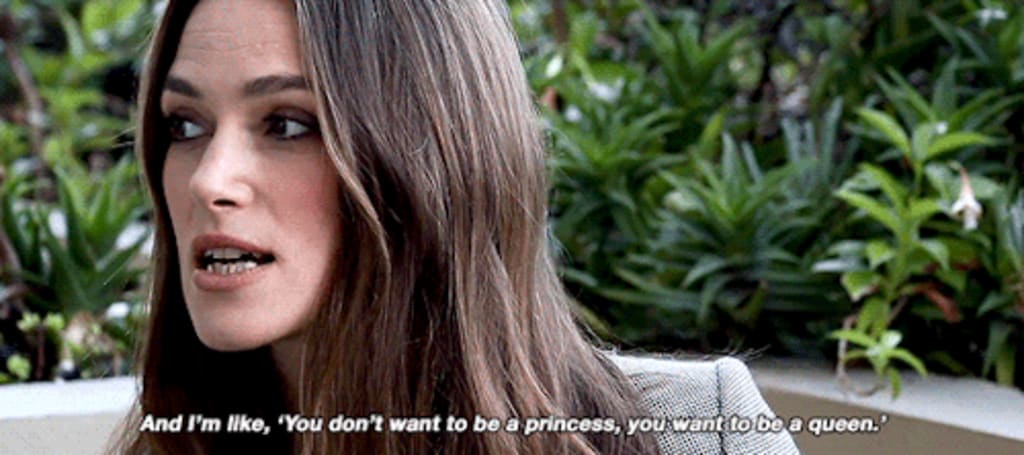
Since the dawn of mainstream entertainment, women have been outliers in film. A study done by Dr. Martha Lauzen revealed that women held only 30 percent of all speaking parts in the top 100 grossing films of 2014. Even when women are given larger parts, they are often cast within a small pool of roles, rarely reaching beyond the supportive wife, or the object of sexual desire for the male protagonist—and the male audience. Although many film studios continue to pump out content whose messages about women are questionable at best, not all portrayals of women are harmful.
Naturally, this is where our reigning Period Drama Queen comes in.
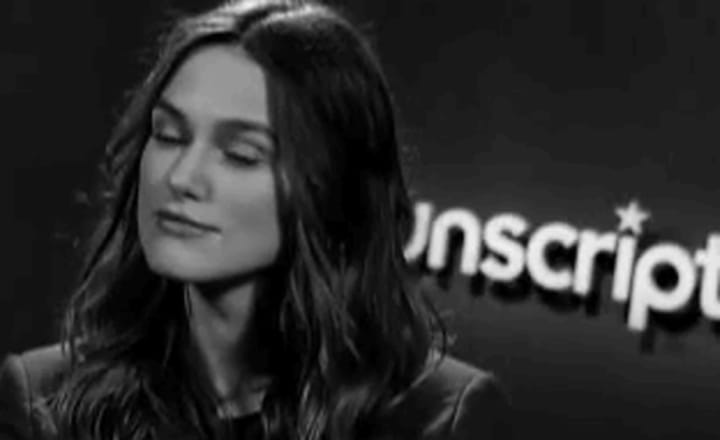
giphy.com
The films Pride and Prejudice (2005) and Colette (2018) are both shining examples of women being given a powerful voice in media, and gender roles being discussed in film from a refreshingly new perspective. Both brought to life by swash-buckling-teen-turned-acclaimed actress Keira Knightley, Elizabeth Bennet of Pride and Prejudice, and the eponymous Colette each navigate their respective worlds while straining against, and ultimately defying, the gender expectations set by their societies.
While Pride and Prejudice is ultimately a story about love and social class resulting in Elizabeth Bennet’s happy marriage to Mr. Darcy, the film challenges gender roles, and helps shift the viewer’s opinion of what a female role can entail.
“I am only resolved to act in that manner which will, in my own opinion, constitute my happiness, without reference to you [or to anyone else]” (Austen, 56).
This line from Elizabeth Bennet is perhaps the best evidence of her standing as a "strong female character," if we're still using that phrase in 2019. She fiercely proclaims her willingness to put her own happiness and desires above any other character’s, particularly a man’s. This is a course of action that was unheard of for women in the 19th century setting of the story, and is still frowned upon by many people today. The existence of almost every woman in the film revolves around securing a husband, but Elizabeth is the rare exception.
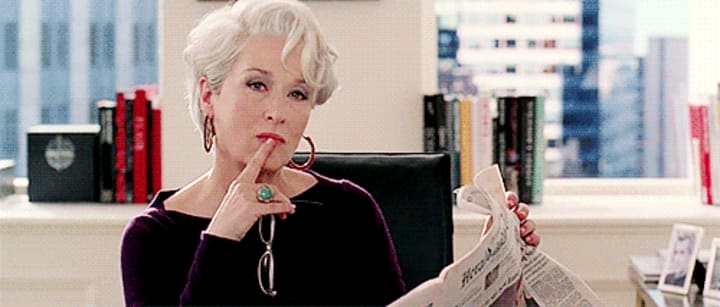
giphy.com
Generally, women in film (and in reality) who put their own desires above others, or whose ambitions do not include marriage and children, are perceived as cold, selfish, and unlikable. The character of Miranda Priestly in The Devil Wears Prada (2006) comes to mind; A successful fashion magazine executive who prioritizes her career and, despite being championed by the internet today as the subject of countless memes and GIFs, is negatively portrayed as demanding and harsh, with very few redeeming qualities.
In contrast, Elizabeth Bennet is characterized by her love for her sisters, her fun-loving personality, and quick-witted mind. When comparing Miranda Priestly with Pride and Prejudice’s Elizabeth, the film shows viewers that, remarkably, it IS possible for a woman to be assertive and put her needs first, while still being a compassionate and amicable person. Imagine that!

giphy.com
In the society of Pride and Prejudice, marriage is a contractual exchange of wealth and goods rather than a romantic affair. As a result, women often feel trapped in their loveless marriages, yet they are expected to obey their husbands, and play the role of housewife for the rest of their lives. This is a reality the protagonist is starkly aware of, and not at all in favour of. This is shown when Elizabeth rejects her friend Charlotte’s engagement to a suitor, describing him as ridiculous, to which Charlotte retorts “Not all of us can afford to be romantic.” Some points were made, Charlotte, some points were made.
Charlotte then goes on to justify her decision, explaining that she has no money, and her chances of marrying into a secure household are dwindling, as she is already 27 years old. This conversation sheds light on the precarious position of women in society, as they are forced to marry at a young age, while they are still desirable to men, or they risk a life of poverty. The character Charlotte serves as a foil to Elizabeth, and allows the film to emphasize her unwillingness to accept the conventional loveless marriage.
Though more unspoken than in the society of Pride and Prejudice, it is undoubtedly true that women today are still expected to conform to the traditional married lifestyle. A study done in 2009 found that “never-married women's social environments are characterized by pressure to conform to the conventional life pathway” (ScienceDaily, 2010). And these women face rude remarks about their relationship status regularly. For these women, Elizabeth Bennet’s defiance could serve as a comfort and a representation of themselves in media. Keira Knightley as Elizabeth Bennet masterfully defies gender stereotypes while portraying women as multi-dimensional people, rather than mere objects of a man’s affection.
Fast-forward thirteen years after Pride and Prejudice’s release, which Ms. Knightley nabbed an Oscar nomination for, she takes another turn as a period drama’s inspiring female lead in Colette.
At this point, the period drama is her BRAND, guys, it's official.
This biographical drama chronicles the vibrant life of French novelist, Sidonie-Gabrielle Colette. The film begins in the late 1800s with young Colette being whisked away from her family farmhouse to marry Willy, a Parisian author. When Willy’s books stop selling, he convinces Colette to write for him, and publishes her work under his name. Colette’s story about a bold schoolgirl named Claudine becomes a best seller, causing Willy’s career to sky-rocket.
Driven by greed and the desire to remain the toast of Paris, Willy goes so far as to cut his wife’s hair, and force her to dress as Claudine, effectively making Colette into a walking advertisement for his brand. The initial success soon turns sour, as Willy demands Colette produce more novels for him, at one point forcibly locking her in a room to make her write. Fed up with being exploited by Willy, Colette seeks creative ownership for her work, and begins a journey of self-discovery, rebelling against gender roles and her husband along the way... as she should be!
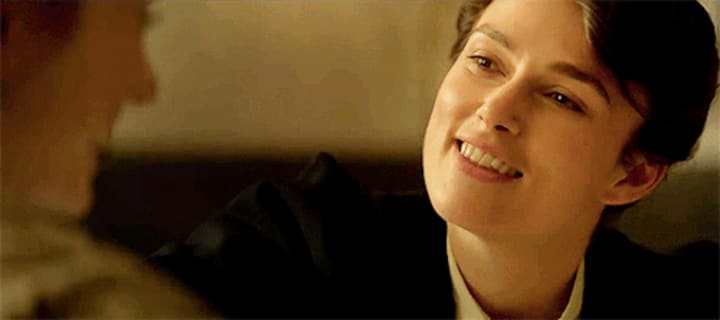
tumblr.com
Now, back to Willy. This f*ckin' guy. Willy is the embodiment of the double standards, misogyny, and social confinements women are subjected to in the film. Very early in their marriage, Colette discovers that Willy has been unfaithful. Instead of offering an explanation or denying the fact, when confronted by his wife Willy responds “this is what men do!” Great excuse, guy, sounds about right!
That utterly eloquent exclamation illustrates the rationale of the time; men are free to behave however they’d like, while women must quietly accept their husband’s actions, and maintain their role as the loyal wife. Willy views Colette, not as an equal human being or partner in marriage, but as a “thing” that he can bend to his will and profit from. And he does, for a time, until Colette realizes her strength, and eventually separates from him. If ever there were an acceptable moment to yell "YASSSSS QUEEN" in a movie theater, that would've been it.
“You found me when I knew nothing. You molded me to your own desires. You thought I could never break free” (Westmoreland, Wash, director, Colette, 2018).
This bold take-down of Willy from Colette references the cycle of men taking advantage of women and perpetuating the male dominated society of the time. Older men marrying much younger, impressionable women and mistreating them in their marriages instills in women the belief that they are lesser things, whose only role is to obey their husbands, giving men all of the power in society. This is the reality of Colette’s own life and marriage, making her endeavor to seek recognition for her writing from a group of male publishers, in turn discrediting her husband, even more admirable. She really did THAT.
The film turns gender roles upon their heads once again through Denise Gough's character Missy. Colette meets Missy, and is instantly intrigued by her, as she identifies with both genders and dresses in men’s clothing. Everything about this character goes against societal expectations of women at the time, but the film’s inclusion of her reminds viewers that people like Missy have existed and been fighting for their rights long before the 21st century. Through this character, the film offers representation to people who identify outside of the gender norms, and ensures that they are not censored from history in the way they so often have been.
Although they tell vastly different stories, the actress playing the lead in both films is hardly the only similarity between Colette and Pride and Prejudice. At the heart of both stories is a spirited young woman far ahead of her time, trapped by societal expectations. Elizabeth Bennet and Colette are intelligent, sharp-tongued, full of life, and unafraid to put their own needs first. Both films highlight conflict in marriage through Colette’s marriage, and Elizabeth Bennet’s romantic tribulations. Pride and Prejudice and Colette also explore the ill-fate of women who do not adhere to social standards, with Elizabeth shamed by a deliciously cruel Judi Dench for being romantically involved with a man above her social class, poor Charlotte forced to marry to save herself from poverty, and the backlash Colette receives for leaving her husband and dating Missy.
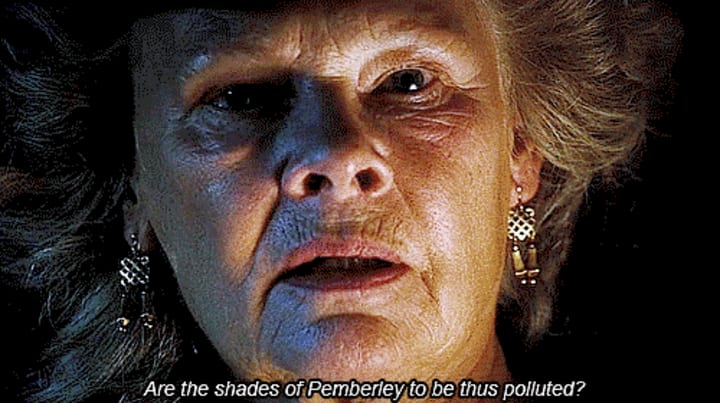
Gipher.com
Despite taking place many years in the past, both films offer commentaries that are pertinent in today’s conversation about gender. Pride and Prejudice provides a lighter, more romantic take, with the major issue at heart being the societal expectations surrounding marriage and the role of women in society. However, the film still offers a well-rounded and inspiring woman, whose unwillingness to marry for anything but love defies the ever-present notion that a woman needs to be married to be complete. As IF.
Colette’s commentary touches on the female voice, sexuality, gender identification, and male abuse of power in society. While Pride and Prejudice focuses solely on traditional, heterosexual relationships and their expectations, Colette looks deeper into the power dynamics within Willy and Colette’s adulterous marriage, and the consequences of Colette and Missy’s unconventional relationship. Colette’s subject matter deals in much higher stakes, with Elizabeth Bennet’s fight to marry for love and prioritize her own needs paling in comparison to Colette being emotionally abused by her husband, exploited, and harassed for kissing Missy publicly.
After analysis, Colette can be seen as the harder-hitting, ultra-rebellious version of Pride and Prejudice, elevating the gender commentary to increasingly diverse and complicated subjects.
In short, Keira Knightley in Pride and Prejudice walked so Keira Knightley in Colette could run.
In 2019, Colette is the more relevant of the two films. Willy forcing Colette to write for him, and using his status to take credit is disconcertingly reminiscent of the exploitation of women by powerful men today. With a call for female voices being heard in the aftermath of the #MeToo movement, a fight against sexual misconduct that shook the male-dominated film industry to its core in October 2017, it stands to reason that the 2018 film Colette addresses more complex gender and feminist issues than 2005s Pride and Prejudice. Hopefully this trend of films becoming more female-centric over time will continue, and seeing women in front of the camera, and writing the stories behind it will no longer be a rare occurrence.
In the words of Colette, “The hand that holds the pen writes history.” It is time to let the women in Hollywood pick up the pen.
References
Austen, Jane. Pride and Prejudice. 1813.
Wright, Joe, director. Pride & Prejudice. 2005.
Westmoreland, Wash, director. Colette. 2018.
Frankel, David, director. The Devil Wears Prada. 2006.
About the Creator
Enjoyed the story? Support the Creator.
Subscribe for free to receive all their stories in your feed. You could also pledge your support or give them a one-off tip, letting them know you appreciate their work.






Comments
There are no comments for this story
Be the first to respond and start the conversation.